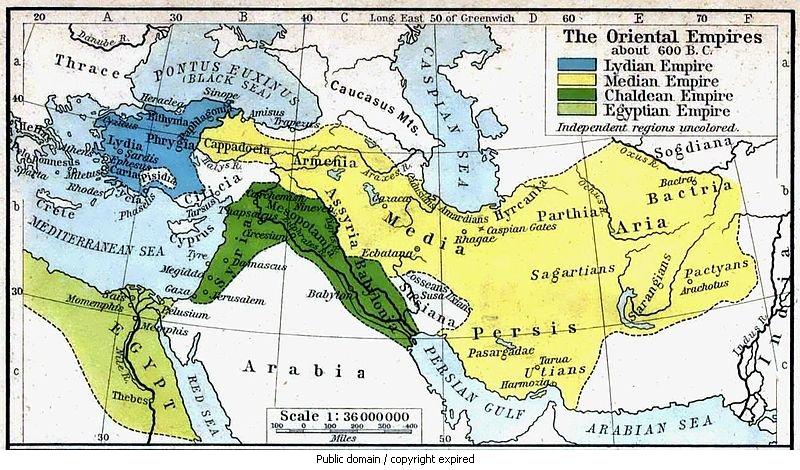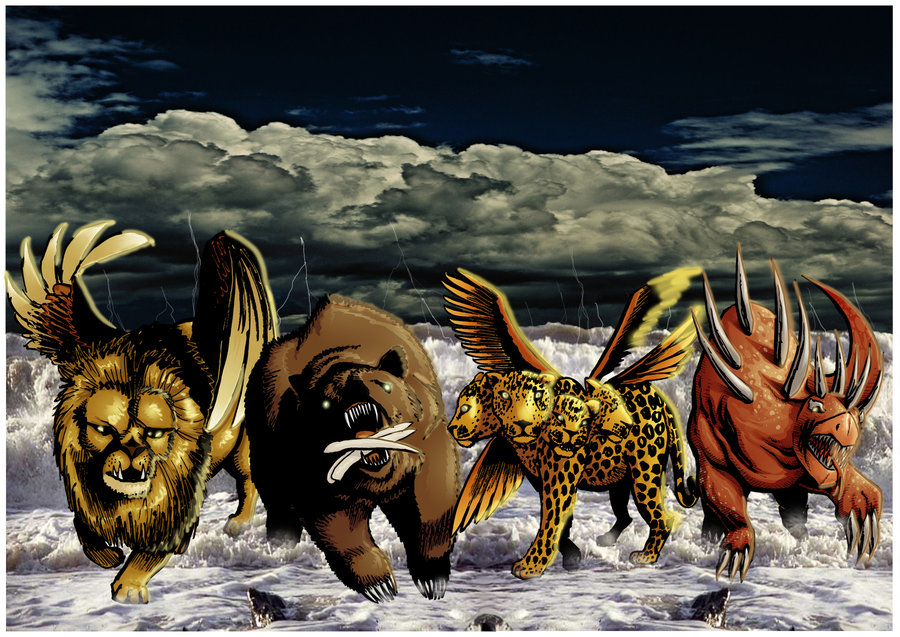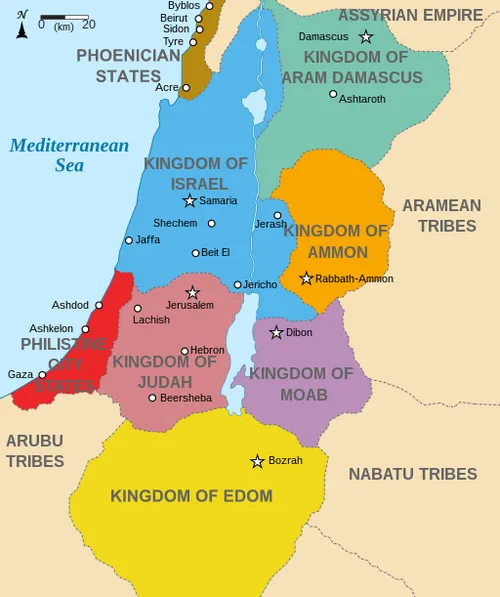
Daniel’s vision of the four beasts
In Daniel chapter 2, king Nebuchadnezzar of Babylon had a dream of an image made from four different metals which Daniel interpreted as four successive kingdoms of man: Babylon, Medo-Persia, Greece and then Rome. Now, in chapter 7, we read that in the first year of Belshazzar king of Babylon (about 552 B.C.1) Daniel had a dream of four great beasts that came up out of the sea (the sea symbolizing nations of people). (All bold are my emphases added. Square brackets [ ] indicate meanings of words. King James Version Easy-Reading Bible (KJVER) used.)
Daniel 7:2, 3 Daniel spake and said, I saw in my vision by night, and, behold, the four winds of the heaven strove upon the great sea. 3 And four great beasts came up from the sea, diverse one from another.
The first beast
Daniel 7:4 The first was like a lion, and had eagle’s wings: I beheld till the wings thereof were plucked, and it was lifted up from the earth, and made stand upon the feet as a man, and a man’s heart was given to it.
The winged-lion was the symbol of Babylon, and the man referred to is Nebuchadnezzar, who God humbled (his wings were plucked) to show him that he was but a man (Daniel 4). Because Nebuchadnezzar exalted himself like a god, God humbled him and made him live like a beast for 7 years, but after that He restored him to his sanity.
In Daniel 2, the kingdom of Babylon was symbolized by the head of Gold, giving the king the most exulted place in the stature, but now God describes this kingdom and those that follow as savage beasts. Possibly God knew if he described Babylon that way to Nebuchadnezzar, Daniel who interpreted the dream, may have been imprisoned or worse.
But since the Lord God gave the revelation directly to Daniel this time it presented no such problem for Daniel. Yet this then is God’s actual view of these ravenous kingdoms.
The symbolism of the two wings on the lion, Isaac Newton interprets as “to denote the kingdoms of Babylonia and Media, which overthrew the Assyrian Empire, and divided it between them, and thereby became considerable, and grew into great Empires.“2
The second beast
Daniel 7:5 And behold another beast, a second, like to a bear, and it raised up itself on one side, and it had three ribs in the mouth of it between the teeth of it: and they said thus unto it, Arise, devour much flesh.
The second beast is identified as Medo-Persia. In history Media governed part of the known world contemporaneously with Babylon but Darius the Mede invaded Babylon in 539 B.C..

Daniel 5:30,31 In that night was Belshazzar the king of the Chaldeans slain. 31 And Darius the Median took the kingdom, being about threescore and two years old.
This was after God had warned Belshazzar, when fingers of a man’s hand came forth and wrote words on the wall of the king’s palace:
Daniel 5:25-28 And this is the writing that was written, MENE, MENE, TEKEL, UPHARSIN. 26 This is the interpretation of the thing: MENE; God has numbered your kingdom, and finished it. 27 TEKEL; You are weighed in the balances, and are found wanting. 28 PERES; Your kingdom is divided, and given to the Medes and Persians.
But the king defiantly threw a party instead; sacrilegiously drinking out of the vessels stolen from the temple of Solomon. While this was happening,
Cyrus’ general Ugbaru diverts the Euphrates river, lowering the moat around Babylon, and quietly enters the city the night of the 16th day of the month of Tashritu (October 12). The invincible city of Babylon is taken without a battle.1
By 536 B.C. Cyrus the Persian king becomes ruler over the entire empire and reigns 7 years until his death in 529 B.C.. Because Persia was the stronger kingdom of the Medo-Persian confederacy it is illustrated by the Bear raised up on one side. This kingdom corresponds to the arms of silver in Daniel 2. Of the three ribs, which the bear devours, Isaac Newton wrote:
And it had three ribs in the mouth of it, between the teeth of it, to signify the kingdoms of Sardes [Sardis, same as Lydia in map above], Babylon [Chaldeans], and Egypt, which were conquered by it, but did not belong to its proper body. And it devoured much flesh, the riches of those three kingdoms.2
The third beast
Daniel 7:6 After this I beheld, and lo another, like a leopard, which had upon the back of it four wings of a fowl; the beast had also four heads; and dominion was given to it.
The next kingdom that followed Medo-Persia was Greece, lead initially by Alexander the Great, who rapidly conquered the known world, symbolized by the winged leopard. But after Alexander died, it broke up into 4 regions governed by four of his leading governors. Alexander’s brother and sons only briefly ruled; there was a lot of family feuding and killing one another for the power to rule. This kingdom corresponds to the belly of brass in Daniel 2. Of this kingdom Isaac Newton wrote:2
The third Beast was the kingdom which succeeded the Persian; and this was the empire of the Greeks, Dan. viii. 6, 7, 20, 21. It was like a Leopard, to signify its fierceness; and had four heads and four wings, to signify that it should become divided into four kingdoms, Dan. viii 22. for it continued in a monarchical form during the reign of Alexander the great, and his brother Aridæus, and young sons Alexander and Hercules; and then brake into four kingdoms, by the governors of provinces putting crowns on their own heads, and by mutual consent reigning over their provinces. Cassander reigned over Macedon, Greece, and Epirus; Lysimachus over Thrace and Bithynia; Ptolemy over Egypt, Lybia, Arabia, Coelosyria, and Palestine; and Seleucus over Syria.
The fourth beast
Daniel 7:7, 23 After this I saw in the night visions, and behold a fourth beast, dreadful and terrible, and strong exceedingly; and it had great iron teeth: it devoured and brake in pieces, and stamped the residue with the feet of it: and it was diverse from all the beasts that were before it; and it had ten horns. 23 Thus he said, The fourth beast shall be the fourth kingdom upon earth, which shall be diverse from all kingdoms, and shall devour the whole earth, and shall tread it down, and break it in pieces.
The fourth beast was Rome, which was known for its ferocity in conquering and subduing its enemies. The iron teeth are a fit description of Rome’s power. Their military power was in part due to their advanced technology and weaponry. This beast was represented by the legs of iron in the Daniel 2 image. Isaac Newton wrote:2
It was larger, stronger, and more formidable and lasting than any of the former. It conquered the kingdom of Macedon, with Illyricum and Epirus, in the eighth year of Antiochus Epiphanes [the Greek king], [167 B.C]; and inherited that of Pergamus, [132 B.C.]; and conquered that of Syria, [68 B.C.], and that of Egypt, [29 B.C.]. And by these and other conquests it became greater and more terrible than any of the three former Beasts. This Empire continued in its greatness till the reign of Theodosius the great; and then brake into ten kingdoms, represented by the ten horns of this Beast;
Theodosius the Great (346 A.D.-395 A.D.) was the last emperor of a united Roman Empire.
Daniel 7:24a And the ten horns out of this kingdom are ten kings that shall arise:…
Those 10 horns that the fourth kingdom, Rome, broke into correspond to the 10 toes of the Daniel 2 image. According to Sir Isaac Newton these 10 kingdoms were as follows.3
… the Western Empire of the Romans, about the time that Rome was besieged and taken by the Goths, became broken into the following ten kingdoms. 1. The kingdom of the Vandals and Alans in Spain and Africa. 2. The kingdom of the Suevians in Spain. 3. The kingdom of the Visigoths. 4. The kingdom of the Alans in Gallia. 5. The kingdom of the Burgundians. 6. The kingdom of the Franks. 7. The kingdom of the Britains. 8. The kingdom of the Hunns. 9. The kingdom of the Lombards. 10. The kingdom of Ravenna.
The Roman kingdom started fracturing and being conquered by these northern tribal kings from around 150 A.D. until the complete collapse of the pagan Roman Empire in the year 476 A.D.
Daniel 7:8 I considered the horns, and, behold, there came up among them another little horn, before whom there were three of the first horns plucked up by the roots: and, behold, in this horn were eyes like the eyes of man, and a mouth speaking great things.
Daniel 7:24b …; and he shall be diverse from the first, and he shall subdue three kings.
Out of the Roman Empire arose another king represented here by the little horn. This horn does not represent an individual king, an individual person. Nowhere in the biblical prophesies are beasts, horns, etc representative of individuals. This little horn represents a new line of kings, a dynasty, a successive line of rulers of the same kingdom. He subdues three of the ten kingdoms that remained from the collapse of the Western Roman Empire According to Isaac Newton they were the kingdoms of Ravenna, the Lombards and the Senate and people of Rome itself.
This new king, that gains power out of the collapse of the pagan Roman Empire, is the Papacy and the Latin Roman Catholic Empire. The biblical description here is very fitting. Of this little horn Isaac Newton wrote (emphases added):3
But it was a kingdom of a different kind from the other ten kingdoms, having a life or soul peculiar to itself, with eyes and a mouth. By its eyes it was a Seer; and by its mouth speaking great things and changing times and laws, it was a Prophet as well as a King. And such a Seer, a Prophet and a King, is the Church of Rome.
A Seer, Επισκοπος, is a Bishop in the literal sense of the word; and this Church claims the universal Bishoprick.
With his mouth he gives laws to kings and nations as an Oracle; and pretends to Infallibility, and that his dictates are binding to the whole world; which is to be a Prophet in the highest degree.
Daniel 7:11 I beheld then because of the voice of the great words which the horn spake: I beheld even till the beast was slain, and his body destroyed, and given to the burning flame.
This king (little horn) spake great words, and as we’ll see below even to claim divinity. The popes have claimed that they were/are installed as the vicar of Christ, God’s representative on Earth. The Greek word for ‘anti’ also has the meaning of substitute. Anti-Christ then means ‘God’s substitute on Earth.’ A Roman Catholic source (F. Lucii Ferraris, 1858) stated (translation, emphasis added):4
As to papal authority, the Pope is as it were God on earth, Sole sovereign of all the faithful of Christ, chief king of kings, having a plentitude of unbroken power, entrusted by the omnipotent God to govern the earthly and heavenly kingdoms.
Daniel 7:20 And of the ten horns that were in his head, and of the other which came up, and before whom three fell; even of that horn that had eyes, and a mouth that spake very great things, whose look was more stout than his fellows. 21 I beheld, and the same horn made war with the saints, and prevailed against them;
We know from history that the Papacy killed millions in its attempts to keep temporal power on Earth. And the Latin Church tried but failed to silence the Reformers, the bible translators, by burning many at the stake for the so-called heresy of translating the bible into the local vernacular.
Daniel 7:12 As concerning the rest of the beasts, they had their dominion taken away: yet their lives were prolonged for a season and time.
The essence of the earlier kingdoms still lives on in some ways in those that succeed them. Isaac Newton explains it like this.3
And therefore all the four Beasts are still alive, tho the dominion of the three first be taken away. The nations of Chaldea and Assyria are still the first Beast. Those of Media and Persia are still the second Beast. Those of Macedon, Greece and Thrace, Asia minor, Syria and Egypt, are still the third. And those of Europe, on this side Greece, are still the fourth. Seeing therefore the body of the third Beast is confined to the nations on this side the river Euphrates, and the body of the fourth Beast is confined to the nations on this side Greece; we are to look for all the four heads of the third Beast, among the nations on this side of the river Euphrates; and for all the eleven horns of the fourth Beast, among the nations on this side of Greece. And therefore, at the breaking of the Greek empire into four kingdoms of the Greeks, we include no part of the Chaldeans, Medes and Persians in those kingdoms, because they belonged to the bodies of the two first Beasts. Nor do we reckon the Greek empire seated at Constantinople, among the horns of the fourth Beast, because it belonged to the body of the third.
The little horn perfectly fits the history of what we know about the Papacy and the Church of Rome.
Daniel 7:25 And he shall speak great words against the Most High, and shall wear out [oppress] the saints [believers] of the Most High, and think to change times and laws: and they shall be given into his hand until a time and times and the dividing of time.
Roman Catholic source (F. Lucii Ferraris, 1858) claimed (translation, emphasis added):4
The Pope is of so great authority and power, that he is able to modify, declare, or interpret even divine laws.
Pope Innocent III (1198-1216) claimed divine authority on Earth (translation, emphasis added):5
It is not a man, but God, who separates those whom the Roman Pontiff (not only as a man, but as the true God’s vice governor on earth), providing for the necessities and the good of the churches, dissolves not with human, but with divine authority.
Ironically Pope Gregory the Great (590–604 A.D.) declared anyone calling himself the Universal Priest is the Anti-Christ. In a letter to Emperor Mauricius Augustus Gregory wrote:6
Whosoever calls himself, or desires to be called, Universal Priest, is in his elation the precursor of Antichrist, because he proudly puts himself above all others. Nor is it by dissimilar pride that he is led into error; for, as that perverse one wishes to appear as God above all men, so whosoever this one is who covets being called sole priest, he extols himself above all other priests.
The following is fair comment:
Pope Gregory the Great condemned the titles of Universal Patriarch, Universal Pope, Universal Bishop and Universal Priest. He saw that such pomposity was satanic or antichrist in nature. In any case, Pope Boniface III (607 A.D.), a mere three years after the death of Gregory, petitioned Emperor Phocus to declare the Roman See the head of all Christian churches and that the title Universal Bishop would apply exclusively to the Bishop of Rome. This was done in an attempt to end the ambitions of the Patriarch of Constantinople.7
As the universal reach of the Latin Church developed and the power of the Papacy became absolute over the kings of Europe the popes became open in their declarations of divinity. Pope Gregory II (669 A.D.–731 A.D.) said:
“All the kings of the West reverence the pope as a God on earth.”8
Gherbert of Rheims, before the year 1000, said of the pope sitting on his lofty throne in gold and purple, that if destitute of charity, he was antichrist sitting in the temple of God.9
God’s kingdom will last forever.
Daniel 7:9,10 I beheld till the thrones were cast down, and the Ancient of Days did sit, whose garment was white as snow, and the hair of His head like the pure wool: His throne was like the fiery flame, and His wheels as burning fire. 10 A fiery stream issued and came forth from before Him: thousand thousands ministered to Him, and ten thousand times ten thousand stood before Him: the judgment was set, and the books were opened.
Daniel 7:13,14 I saw in the night visions, and, behold, one like the Son of man came with the clouds of heaven, and came to the Ancient of Days, and they brought him near before him. 14 And there was given Him dominion, and glory, and a kingdom, that all people, nations, and languages, should serve Him: His dominion is an everlasting dominion, which shall not pass away, and His kingdom that which shall not be destroyed.
In the end God will judge all nations and especially these kingdoms. Their thrones will be ‘cast down’ when the Almighty returns in judgement. This means the prophecy is not yet finished and takes us through to the Second Advent of the Lord Jesus Christ.
Daniel 7:22 Until the Ancient of Days [God the Father] came, and judgment was given to the saints of the Most High; and the time came that the saints possessed the kingdom.
The kingdom of the Anti-Christ (the little horn) will eventually be destroyed. Quite obviously in 2015 that has not yet happened. The little horn’s power has grown again since Napoleon Bonaparte (in 1870) conquered the Papal States and greatly reduced, but did not completely destroy, his power.
Daniel 7:26,27 But the judgment shall sit, and they shall take away his dominion, to consume and to destroy it unto the end. 27 And the kingdom and dominion, and the greatness of the kingdom under the whole heaven, shall be given to the people of the saints of the Most High, whose kingdom is an everlasting kingdom, and all dominions shall serve and obey him.
Notes and References
- Here is a useful timeline for the kings through this period of history.
- Isaac Newton, Observations upon the Prophecies of Daniel, and the Apocalypse of St. John, Chapter IV, produced by Greg Alethoup, Robert Shimmin, Keith Edkins and the Online Distributed Proofreading Team. Release Date: October 15, 2005 [EBook #16878] under the terms of the Project Gutenberg License included with this eBook or online.
- Isaac Newton, Observations upon the Prophecies of Daniel, and the Apocalypse of St. John, Chapter VII.
- Papal Claims to Authority and translations of source texts Prompta Bibliotheca Canonica, Juridica, Moralis, Theologica, Ascetica, Polemica, Rubristica, Historica.
by Lucius Ferraris, scanned pages from Prompta Bibliotheca (Handy Library) are from Vol. 5, published in Petit-Montrouge (Paris) by J. P. Migne, 1858 edition, - Papal Claims to Authority and source texts DECRETALES D. GREGORII PAPAE IX, SUAE INTEGRITATI UNA CUM GLOSSIS RESTTUTE Ad exemplar Romanum diligenter recognite, LUGDUNI, 1584, liber I, titulus VII – De Translatione Episcopi, cap. III, col. 217. (138) Download entire volume, .pdf. All 5 volumes are available at Gallica.
- Papal Claims to Authority and Source: Pope Gregory the Great (590–604), Letter to Emperor Mauricius Augustus (against assumption of title “universal” by Patriarch of Constantinople) in his Epistles, bk. 7, letter 33, trans. in NPNF, 2d series, Vol. 12, p. 226 (2d pagination). BOOK VII, EPISTLE XXXIII: TO MAURICIUS AUGUSTUS online at EWTN. (You will need to scroll down to find the document)
- Papal Claims to Authority
- Henry Grattan Guinness, Romanism and the Reformation, p. 28, 3. PAUL’S FOREVIEW OF ROMANISM, available here. (Henry Grattan Guinness – 11 August 1835 – 21 June 1910 – an Irish Protestant Christian preacher, evangelist and author.)
- Henry Grattan Guinness, Romanism and the Reformation, p. 55, 5. INTERPRETATION IN PRE-REFORMATION TIMES, available here.
Recommended Reading
- Book: Apocalypse Now: On the Revelation of Jesus Christ
- Book: Merchants of Death: Global Oligarchs and Their War On Humanity
Follow me
- Telegram.org: @GideonHartnett
- Facebook: Gideon Hartnett
- X (Twitter): @gideon195203

To be notified by email put your email address in the box at the bottom of your screen. You’ll get an email each time we publish a new article.

Click this image to make a secure Donation (Stripe) !







2 responses to “Daniel 7 Prophecy”
Well done John.
Newton was obviously aware of how his contemporaries’ interpreted the ten kingdoms. Today there may be individuals who also do, but the only church I am aware of who see it the same way are the Seventh Day Adventists.
Many see the blasphemous little horn as the very antichrist, not so many link it to the Papacy, (but to some futurist view), but and also here the SDA as a church believe the same.
The futurist view is a Jesuit 16th century device to take the heat off the Papacy, whom back then well nigh all protestants believed to be the foretold antichrist. Today nearly all churches has, by design or by deception, fallen for this Jesuit ploy.
LikeLike
Andrew, I believe (but don’t know for certain) that a few of the reformed denominations still hold this view. But that is not the main issue, but as you say, it is to not blindly follow a doctrine that most evangelical denominations have been deceived into believing. The Jesuits were known to be very smart and this ploy has worked.
LikeLike